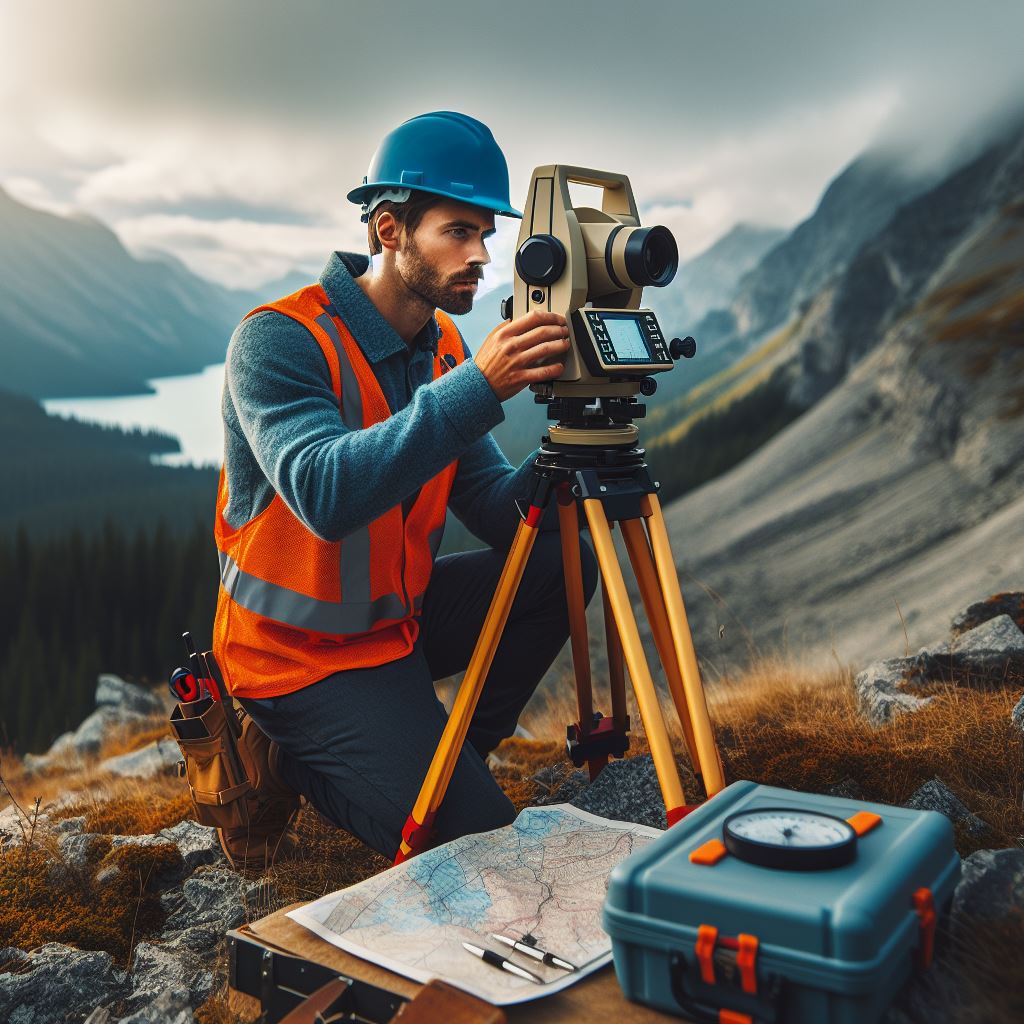Introduction
Land surveys play a vital role in establishing ownership and planning for development.
Indigenous land surveys in Canada are crucial for recognizing ancestral territories and rights.
Indigenous land surveys in Canada have unique aspects that distinguish them from non-indigenous land surveys.
“Within the vast tapestry of Canada’s diverse landscapes, Indigenous land surveys stand as a testament to the rich interplay of heritage, geography, and governance.
This comprehensive exploration not only unravels the unique aspects of these surveys but also delves into the symbiotic relationship between Indigenous communities and the land.
Navigating the historical tapestry, we uncover the evolving methodologies and the profound significance of these surveys in safeguarding cultural legacies.
Beyond cartography, this journey encompasses the intricate web of relationships, legal considerations, and the ongoing dialogue shaping the trajectory of Indigenous land stewardship.
As we embark on this odyssey, we aim to foster a deeper appreciation for the complexities inherent in Indigenous land surveys, advocating for a future where respect for tradition and collaborative strategies harmonize for the sustainable preservation of these sacred terrains.”
Historical Background
Overview of the history of indigenous land surveys
Indigenous land surveys in Canada have a complex and tumultuous history that spans several centuries.
As European settlers arrived in North America, they began to lay claim to Indigenous territories.
Indigenous peoples had their own systems of land management and use, which differed from European concepts of property ownership.
The imposition of land surveys by European colonizers was an attempt to assert control and establish new boundaries.
This often resulted in the displacement and marginalization of Indigenous communities.
Early land surveys were conducted primarily for strategic and economic purposes, rather than for the benefit of Indigenous peoples.
The lack of consultation and respect for Indigenous rights in these surveys laid the groundwork for ongoing conflicts and land disputes.
These surveys often ignored or disregarded Indigenous land tenure systems, leading to the loss of traditional lands and resources.
The impact of colonialism and the Indian Act
The implementation of colonial policies and the enactment of the Indian Act further compounded the challenges faced by Indigenous communities.
Under colonial rule, Indigenous lands were systematically expropriated and allocated to European settlers.
The Indian Act, introduced in 1876, imposed even greater control over Indigenous peoples and their land.
It granted the Canadian government the power to designate reserve lands for Indigenous communities.
Land surveys conducted during this period were used to determine the boundaries of reserves, often resulting in inadequate land allocations.
These surveys were also used as a means of assimilation, as they aimed to enforce a sedentary agricultural lifestyle on Indigenous populations.
The impact of colonialism and the Indian Act on Indigenous land surveys cannot be overstated.
They disrupted Indigenous land tenure systems, eroded traditional practices, and contributed to the loss of cultural heritage.
The Royal Proclamation of 1763 and the modern treaty process
The Royal Proclamation of 1763 is a significant document in the history of Indigenous land surveys in Canada.
Unlock Your Career Potential
Visualize a clear path to success with our tailored Career Consulting service. Personalized insights in just 1-3 days.
Get StartedIt recognized Indigenous rights to traditional territories and established a framework for negotiating land agreements.
However, the implementation of the Proclamation was inconsistent, and many Indigenous nations were not adequately included in treaty negotiations.
In recent decades, there has been a push for modern treaty processes to address historical grievances and land claims.
These processes aim to facilitate the negotiation and settlement of comprehensive land agreements with Indigenous nations.
Modern treaty agreements recognize and affirm the rights of Indigenous peoples to their lands and resouces.
They strive to address the injustices of the past and establish a more equitable relationship between Indigenous and non-Indigenous peoples.
Despite the progress made through modern treaty processes, Indigenous land surveys in Canada continue to be influenced by historical legacies.
Read: Women in Surveying: Changing Trends in Canada
Legal Framework for Indigenous Land Surveys
The legal basis for indigenous land surveys
Indigenous land surveys in Canada are conducted within a specific legal framework that recognizes the rights and interests of Indigenous communities.
These surveys are not merely a technical exercise to map land; they have legal implications and are deeply rooted in the historical and ongoing relationship between Indigenous peoples and the Canadian government.
The legal basis for indigenous land surveys can be traced back to several key documents and principles.
First and foremost, the Canadian Constitution Act of 1982 holds significant importance.
This act recognizes and affirms existing Aboriginal and treaty rights of the Indigenous peoples of Canada.
The role of the Constitution Act, 1982
The Constitution Act, 1982, is a critical component of the legal framework for indigenous land surveys.
Section 35 of this act explicitly recognizes and protects the rights of Indigenous peoples, including their ancestral lands and territories.
It provides a constitutional protection that has major implications for the establishment and conduct of land surveys in Indigenous communities.
This act has played a transformative role by acknowledging the historical injustices faced by Indigenous peoples and the need to address their land rights.
It establishes a legal foundation that obligates both the federal and provincial governments to consult and accommodate Indigenous communities before proceeding with any decision or activity that may impact their rights or interests.
The duty to consult and accommodate indigenous communities
One of the significant aspects of the legal framework for indigenous land surveys is the duty to consult and accommodate Indigenous communities.
This duty, established through Canadian case law and reinforced by international human rights standards, requires governments to engage in meaningful consultation and, where appropriate, reach agreements on how to accommodate Indigenous interests.
The duty to consult and accommodate arises when the government makes decisions or carries out activities that may infringe on Indigenous rights.
It recognizes the unique relationship between Indigenous peoples and the land they have inhabited for generations, ensuring that their voices are heard, and their perspectives are taken into account.
For indigenous land surveys, this duty translates into a requirement to inform and involve Indigenous communities from the very beginning of the survey process.
It necessitates engaging with traditional knowledge holders and ensuring their participation and consent in the survey activities.
Overall, the legal framework for indigenous land surveys in Canada goes beyond technical mapping exercises.
It recognizes the historical and ongoing rights of Indigenous peoples, establishes a duty for governments to consult and accommodate, and prioritizes the importance of Indigenous voices and perspectives.
By incorporating these unique aspects into the survey process, Canada aims to reconcile its relationship with Indigenous communities and promote a more inclusive and equitable approach to land management.
Read: A Day in the Life of a Canadian Electrical Engineer
Cultural Considerations in Indigenous Land Surveys
Emphasizing the importance of cultural factors
Indigenous land surveys in Canada require a deep understanding of the cultural factors at play.
This includes acknowledging the unique perspectives and values of the Indigenous communities involved.
By putting cultural factors at the forefront, the surveys can be conducted in a way that respects and preserves Indigenous traditions.
The concept of ancestral ties to the land
For Indigenous communities, the land is not merely a piece of property but a vital part of their identity.
Ancestral ties to the land connect Indigenous people to their heritage and play a significant role in their cultural practices.
The land holds stories, memories, and a sense of belonging that cannot be easily quantified.
The significance of land for cultural practices and spirituality
The importance of land in Indigenous cultural practices cannot be overstated.
It is a place where ceremonies are held, songs are sung, stories are shared, and traditional knowledge is passed down through generations.
Land is seen as a teacher and a healer, providing sustenance and spiritual nourishment to Indigenous communities.
Indigenous land surveys must take into account the spiritual significance attached to different areas of land.
These spaces often hold sacred sites, such as burial grounds or places of worship, which must be respected and protected.
The inclusion of Indigenous elders and knowledge keepers in the survey process is crucial to ensure the cultural integrity of the land is upheld.
Engaging with Indigenous communities throughout the entire survey process fosters mutual respect and understanding.
This involves cultivating relationships, building trust, and seeking consent from Indigenous communities before initiating any land survey activities.
An integral part of cultural considerations in these surveys is the inclusion of Indigenous Traditional Knowledge (TK).
Traditional Knowledge holds valuable insights into land use, ecological systems, and conservation practices.
By incorporating TK, land surveys can benefit from Indigenous wisdom and enhance the overall quality and accuracy of the data collected.
In fact, cultural considerations are essential in Indigenous land surveys in Canada.
Respecting and understanding Indigenous cultural factors, recognizing ancestral ties to the land, and acknowledging the significance of land for cultural practices and spirituality are crucial.
Engaging with Indigenous communities, incorporating Traditional Knowledge, and addressing historical injustices ensure a more comprehensive and respectful survey process.
By embracing cultural perspectives, land surveys can contribute to the empowerment and self-determination of Indigenous communities, while also promoting environmental stewardship and sustainable land management.
Read: Work-Life Balance: Mech Engineers CA

You Might Also Like: Mech Engineer Salaries Across Canada
Collaborative Approaches in Indigenous Land Surveys
The Importance of Collaboration between Indigenous Communities and Government Agencies
Collaboration between indigenous communities and government agencies is crucial in conducting successful land surveys.
Indigenous communities possess invaluable knowledge and connection to the land, which can greatly enhance survey outcomes.
This collaboration ensures that the surveys are conducted in a respectful and culturally sensitive manner.
Indigenous communities have been stewards of their lands for generations, and their deep understanding of the land’s history, resources, and ecological systems is unparalleled.
Government agencies, on the other hand, bring technical expertise and resources to the table.
By pooling their knowledge, both parties can benefit and achieve more comprehensive and accurate land surveys.
Moreover, collaboration fosters a sense of shared ownership and accountability.
It allows indigenous communities to actively participate in decision-making processes and contribute to the development of management plans for their lands.
This ensures that their rights, values, and traditions are respected and preserved.
The Role of Indigenous Knowledge and Expertise
Indigenous knowledge and expertise play a pivotal role in indigenous land surveys.
Traditional knowledge holds insights that are often overlooked by conventional survey methods.
Indigenous communities possess a holistic understanding of their lands, encompassing cultural, spiritual, and ecological dimensions.
Indigenous knowledge systems have been developed and refined over centuries, incorporating observations, teachings, and practices passed down through generations.
This knowledge is deeply rooted in the land and encompasses intricate ecological relationships, weather patterns, medicinal plants, and sustainable resource management techniques.
When incorporated into land surveys, indigenous knowledge enhances the accuracy and relevance of the data collected.
Moreover, it can uncover hidden or hard-to-detect ecological features, document seasonal variations, and identify areas of cultural significance.
Government agencies recognize the value of this knowledge and its contribution to sustainable land management.
Successful Examples of Collaboration in Land Surveys
There have been several successful examples of collaboration between indigenous communities and government agencies in land surveys.
In the Ouje-Bougoumou Cree Nation in Quebec, Canada, collaboration between the community and the Canadian government resulted in a comprehensive land survey that integrated traditional knowledge with modern survey techniques.
This collaboration enabled the community to assert their rights, protect sacred sites, and ensure sustainable land use practices.
The Tsleil-Waututh Nation in British Columbia partnered with government agencies to conduct a land survey that incorporated both Western scientific data and indigenous knowledge.
This collaboration not only produced robust data for land management but also strengthened the community’s voice in decision-making processes.
These examples demonstrate the power of collaboration in indigenous land surveys.
By recognizing and valuing indigenous knowledge, government agencies can develop more inclusive and effective strategies to manage and protect indigenous lands.
In general, collaboration between indigenous communities and government agencies is crucial in conducting land surveys that are respectful, inclusive, and comprehensive.
Indigenous knowledge and expertise bring unique insights that greatly enhance survey outcomes.
Successful collaborations have already paved the way for more inclusive and effective land management strategies.
Moreover, by embracing these collaborative approaches, we can ensure the preservation and sustainable management of indigenous lands for future generations.
Read: Continuing Ed for Mech Engineers in CA
Resolving Conflicts and Challenges
Identification of common challenges in indigenous land surveys
- Limited recognition of indigenous land rights can lead to conflicts and disputes.
- Differing perspectives and understandings of land ownership and use can create challenges.
- Historical injustices and colonization have resulted in mistrust and tension between indigenous communities and authorities.
- Lack of adequate resources and funding for land surveys hinders efficient and comprehensive data collection.
- Language and cultural barriers may arise, affecting effective communication throughout the survey process.
Strategies for resolving conflicts and promoting cooperation
- Engaging in meaningful consultation and collaboration with indigenous communities from the outset.
- Employing culturally sensitive approaches that respect and incorporate indigenous knowledge and practices.
- Establishing clear and transparent processes for addressing grievances and disputes.
- Facilitating capacity-building initiatives to empower indigenous communities in land survey matters.
- Providing adequate resources and funding to ensure thorough and accurate land surveys.
The significance of reconciliation and resource-sharing agreements
- Reconciliation serves as a crucial foundation for resolving conflicts and achieving lasting solutions.
- Resource-sharing agreements can help address historical disparities and foster cooperation between indigenous communities and other stakeholders.
- These agreements enable indigenous communities to benefit economically from their land and resources.
- They promote cooperation and collaboration, leading to sustainable land management practices.
- Reconciliation and resource-sharing agreements contribute to the overall well-being and self-determination of indigenous communities.
In a nutshell, indigenous land surveys in Canada face various challenges.
These challenges include limited recognition of land rights, differing perspectives, historical injustices, resource constraints, and communication barriers.
Resolving conflicts and promoting cooperation requires meaningful consultation, cultural sensitivity, transparent processes, capacity-building, and adequate resources.
Furthermore, reconciliation and resource-sharing agreements play a significant role in achieving lasting solutions and empowering indigenous communities in Canada.
Conclusion
Throughout this blog post, we have explored the unique aspects of indigenous land surveys in Canada.
We learned that these surveys are not just about measuring boundaries, but also hold cultural and historical significance for indigenous communities.
Indigenous land survey involve a collaborative process that incorporates traditional knowledge and respect for the land.
The unique aspects of indigenous land survey in Canada include the recognition and inclusion of indigenous perspectives and the emphasis on preserving cultural heritage.
These surveys prioritize the connection between land and identity, challenging traditional survey methods.
It is essential to continue researching and understanding indigenous land rights and survey in Canada.
By doing so, we can promote a more inclusive and equitable approach to land surveying.
This knowledge will contribute to fostering respectful relationships between indigenous communities and land surveying professionals.
Indigenous land surveys in Canada require a shift in perspective and a deep understanding of cultural values.
Moreover, by acknowledging and respecting the unique aspects of these surveys, we can work towards reconciliation and strengthen the connection between indigenous communities and their ancestral lands.




